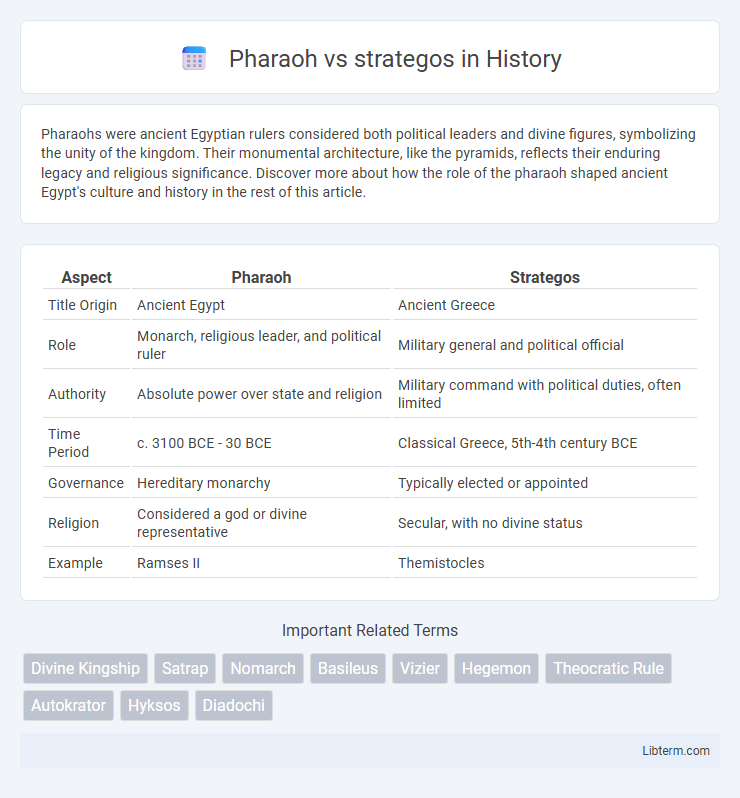Pharaohs were ancient Egyptian rulers considered both political leaders and divine figures, symbolizing the unity of the kingdom. Their monumental architecture, like the pyramids, reflects their enduring legacy and religious significance. Discover more about how the role of the pharaoh shaped ancient Egypt's culture and history in the rest of this article.
Table of Comparison
| Aspect | Pharaoh | Strategos |
|---|---|---|
| Title Origin | Ancient Egypt | Ancient Greece |
| Role | Monarch, religious leader, and political ruler | Military general and political official |
| Authority | Absolute power over state and religion | Military command with political duties, often limited |
| Time Period | c. 3100 BCE - 30 BCE | Classical Greece, 5th-4th century BCE |
| Governance | Hereditary monarchy | Typically elected or appointed |
| Religion | Considered a god or divine representative | Secular, with no divine status |
| Example | Ramses II | Themistocles |
Introduction: Defining Pharaoh and Strategos
Pharaoh refers to the ancient Egyptian monarch who held supreme political and religious authority as both king and god-king. Strategos was a military general and political leader in ancient Greece, responsible for commanding armies and managing civic affairs in city-states like Athens. Both roles embodied leadership but differed significantly in cultural context, divine association, and governance structure.
Historical Contexts: Egypt vs. Greece
The Pharaoh in ancient Egypt held absolute religious and political authority, embodying divine kingship to maintain order and legitimacy in a theocratic society. In contrast, the Greek strategos operated as a military general elected in city-states like Athens, reflecting a democratic or oligarchic governance structure where power was more distributed. This difference highlights Egypt's centralized theocratic monarchy versus Greece's varied political systems with emphasis on civic participation and military leadership.
Origins and Evolution of Leadership Roles
Pharaohs, originating in ancient Egypt around 3100 BCE, held divine authority as both political and religious leaders, symbolizing centralized power and theocratic rule. The title "strategos," emerging in ancient Greece around the 5th century BCE, referred to a military general elected or appointed to lead armies and manage civic duties, reflecting a more militaristic and bureaucratic leadership evolution. Over time, pharaohs embodied absolute monarchy intertwined with divine kingship, while strategoi represented evolving democratic governance and military specialization in Greek city-states.
Political Power Structures
Pharaohs wielded centralized, divine authority in ancient Egypt, combining religious and political power within a theocratic monarchy that reinforced social hierarchy and state control. Strategos, prominent in ancient Greek city-states, particularly Athens, functioned as elected military generals with political influence, reflecting a more distributed power structure embedded in early democratic governance. The pharaoh's absolute rule contrasts with the strategos' role within a collective leadership, illustrating divergent political power structures between autocratic and republican systems.
Military Authority and Command
Pharaohs wielded absolute military authority, acting as both supreme commander and divine ruler, orchestrating large-scale campaigns and controlling elite warrior classes such as the chariot corps. Strategos, originating in ancient Greece, functioned as elected military generals with strategic command over citizen-soldiers and naval forces, often holding political power alongside their military role. The Pharaoh's command was centralized and hereditary, whereas the strategos operated within a system of shared governance and accountability to the polis.
Religious Influence and Divine Right
Pharaohs were considered living gods with absolute religious authority, embodying divine right by serving as intermediaries between the gods and the people in ancient Egypt. Strategoi, in contrast, were military generals in ancient Greece who derived authority primarily from civic and military power rather than divine sanction. The religious influence of a pharaoh reinforced centralized power through rituals and temple patronage, while strategoi operated within secular political frameworks without claims to divine status.
Administrative Systems and Governance
Pharaohs centralized authority by integrating religious and political power, establishing a divine kingship that governed Egypt through a hierarchy of officials and scribes responsible for tax collection, law enforcement, and resource management. Strategos, in contrast, operated within the Hellenistic administrative system as military governors appointed by the central monarchy to oversee provinces, combining military command with civil administration to maintain control and implement royal policies. The pharaonic system emphasized centralized, theocratic rule, while the strategos model relied on delegated authority within a more militarized and bureaucratic governance structure.
Legacy and Cultural Impact
Pharaohs solidified their legacy through monumental architecture like the pyramids, symbolizing divine authority and eternal power in ancient Egyptian culture. Strategos, as military leaders in ancient Greece, influenced warfare tactics and political structures, shaping the rise of city-states and democratic principles. The cultural impact of Pharaohs is evident in religious traditions and art, while strategos contributed to the evolution of military strategy and governance.
Key Figures: Famous Pharaohs and Renowned Strategoi
Famous Pharaohs such as Ramses II and Tutankhamun solidified their legacy through monumental architecture and military campaigns that expanded and protected ancient Egypt's empire. Renowned strategoi like Alexander the Great and Hannibal Barca demonstrated unmatched tactical genius, reshaping the course of history through decisive battles and innovative warfare techniques. The contrasting leadership styles of these key figures highlight the distinct roles of pharaohs as divine kings and strategoi as military commanders in shaping their civilizations.
Comparative Analysis: Lasting Lessons from Ancient Leaders
Pharaohs exercised absolute divine authority, centralizing political and religious power to maintain stability and unity in ancient Egypt, whereas strategoi operated as military commanders within the democratic framework of ancient Athens, emphasizing tactical leadership and civic responsibility. Pharaohs' legacy teaches the importance of centralized vision in nation-building, while strategoi demonstrate adaptive leadership and strategic innovation in warfare. Comparing these roles reveals enduring lessons on balancing authority with accountability and the impact of leadership structures on societal resilience.
Pharaoh Infographic

 libterm.com
libterm.com